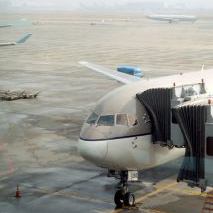 Passenger rights advocates are renewing their push for legislation to protect fliers from excessive airport delays, after an incident last Friday in which 48 people were stranded on a plane for more than five hours.
Passenger rights advocates are renewing their push for legislation to protect fliers from excessive airport delays, after an incident last Friday in which 48 people were stranded on a plane for more than five hours.
Continental Connection Flight 2816, which was operated by regional carrier ExpressJet, was headed from Houston to Minneapolis-St. Paul airport Friday night when bad weather forced it to divert to Rochester, Minnesota.
The plane landed at Rochester after midnight then sat on the runway for the next five and half hours while the airline debated what to do with the passengers. The terminal was a mere 50 feet away, but they were not given the option to get off.
With no food or water and only one restroom, the plane soon became hot, smelly and uncomfortable for the group of 48 tired travelers, which included two babies.
Company spokeswoman Kristy Nicholas said that ExpressJet tried to arrange for buses to get the passengers to Minneapolis, which was 75 miles away. However, she claimed that this option was scrapped due to flooding on local roads.
ExpressJet claims that passengers were not allowed to deplane because the airport did not have adequate ground crew or security screening staff to handle everyone. The plane also had to wait for another flight crew had to be flown in to relieve the original crew, who had gone over their duty-time limit.
Check out Peter’s solution for preventing delays in Of Travel and Politics.
However, Rochester airport spokesman Steven Leqve disputed ExpressJet’s claims about the ground crew. He said that his staff made numerous offers to deplane the passengers, but Continental Express dispatchers refused. He also said that the fact that there were no security officers was irrelevant, because passengers could have been held in a secure area of the airport.
 Furthermore, a Delta aircraft that was diverted to the same airport later that night deplaned its passengers via an available gate, then sent them by chartered bus to Minneapolis.
Furthermore, a Delta aircraft that was diverted to the same airport later that night deplaned its passengers via an available gate, then sent them by chartered bus to Minneapolis.
In the end, the ExpressJet passengers were allowed to enter the airport once security personnel arrived at 6 a.m. They re-boarded after a couple of hours, and the plane took off again at 8:30 a.m. for the 45-minute flight to Minneapolis.
The tired and cranky passengers were justifiably angry after their ordeal, and stormed the Continental ticket counter in Minneapolis demanding compensation. Continental issued an apologetic statement saying that ExpressJet’s service was “unacceptable” and that full refunds and travel vouchers would be issued.
The timing of the incident may give a needed push to legislation aimed at preventing such situations from occurring, which is currently making its way through Congress.
“This incident has launched the issue of passenger rights back into public eye,” said passenger-rights advocate Kate Hanni, who has been pushing for legislation since 2007. “The situation in Rochester was deplorable. It reminds us that airlines have proven that they have no will to correct a situation themselves.”
The so-called Passenger Bill of Rights has already been passed by the House of Representatives, and just recently made it through an important Commerce Committee vote in the Senate.
Learn more about the bill here: FAA Reauthorization Bill Includes Passenger Rights, Air Traffic Control Modernization.
However, Hanni thinks that the House version of the bill is too watered down to have much effect. “The House version only stipulates that airlines have an emergency plan that says how they will deplane passengers in the event of a delay, but not when,” Hanni said.
 The Senate’s version of the bill, which will be voted on after the Congressional recess in September 30, is more robust and limits runway delays to three hours. It also includes provisions to provide passengers with water, snacks and medical attention while they are on the tarmac.
The Senate’s version of the bill, which will be voted on after the Congressional recess in September 30, is more robust and limits runway delays to three hours. It also includes provisions to provide passengers with water, snacks and medical attention while they are on the tarmac.
The airline industry is fighting the time-delay provisions of the law because they claim that the number of incidents that occur each year are statistically insignificant. Groups such as the Air Transport Association of America argue that a three-hour rule would lead to more cancellations and inconvenience passengers system-wide.
But Kate Hanni thinks that the inconvenience of a canceled flight is nothing compared to the discomfort of basically being held hostage on a plane with no food, water or information. She became an advocate after enduring a similar ordeal back in 2006, when she was stranded on a plane for more than seven hours.
Hanni also notes that the number of planes that have suffered delays of more than three hours has actually increased since last summer, even with decreased number of people traveling.
By Karen Elowitt for PeterGreenberg.com.
Related links: New York Times, USA Today, Bloomberg
More related links:












